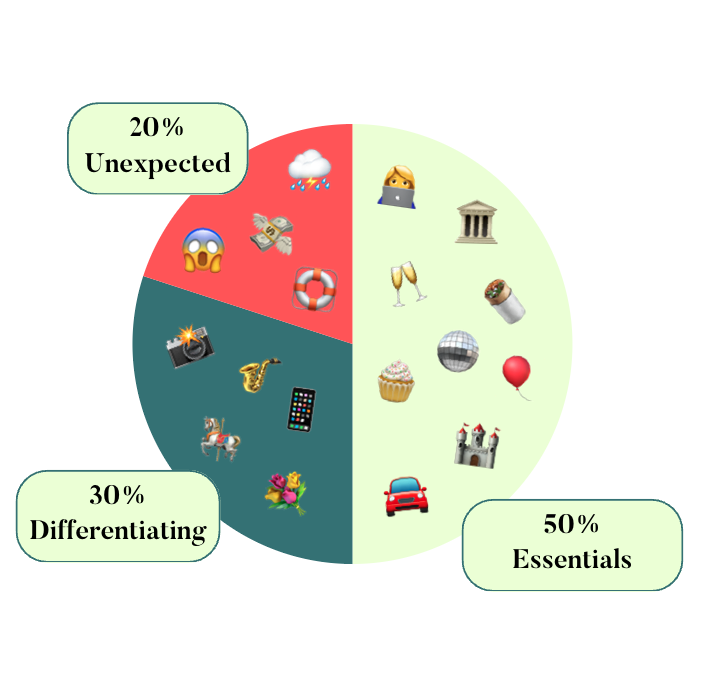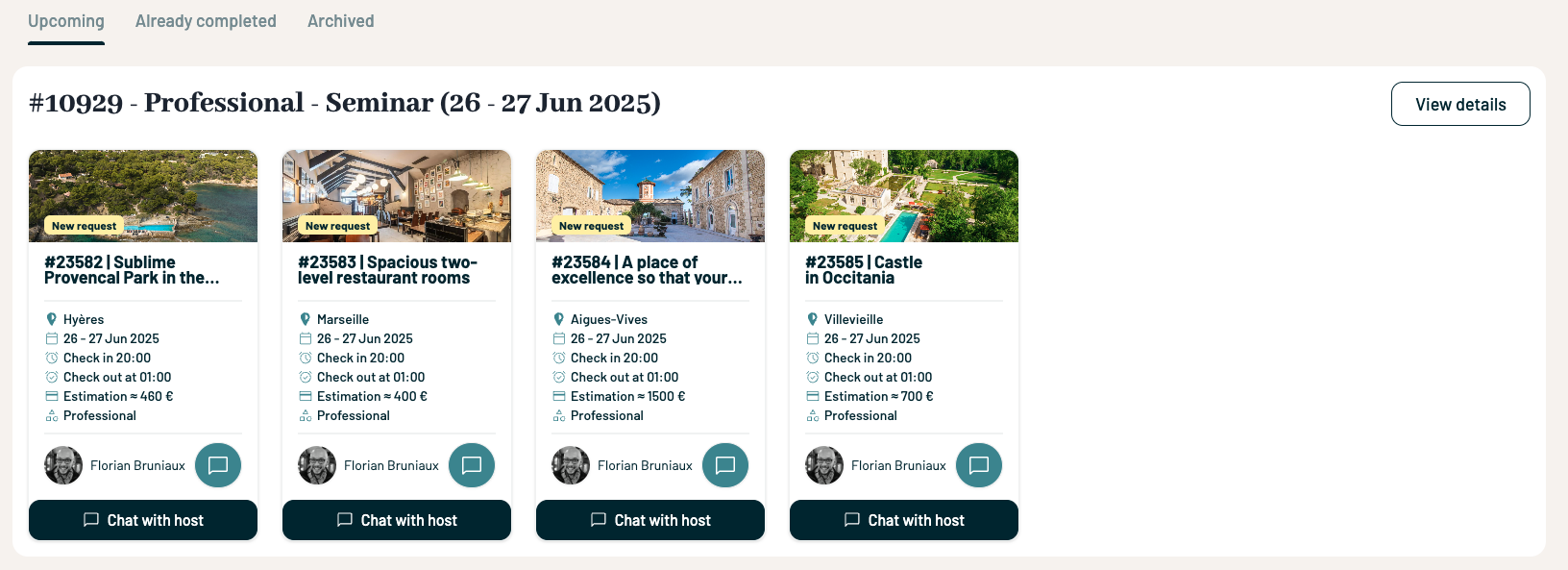
How to Set a Budget for an Event?
Planning a successful event starts with smart budgeting. A well-defined budget helps anticipate costs, optimize spending, and avoid last-minute surprises. Here’s a step-by-step guide to keep your event on track.
1. Define Your Objectives and Event Type
Before crunching numbers, it's essential to identify the type of event and its goals.
What Type of Event Are You Planning?
🎉 Private: Wedding, birthday, baptism...
💼 Corporate: Seminar, conference, product launch...
💰 Charity: Gala, fundraiser...
Setting Key Objectives
-
Networking: Encourage connections, create business opportunities, and strengthen partnerships.
-
Immersive Experience: Provide guests with a memorable experience, build team cohesion.
-
Promotion: Boost brand awareness, generate word-of-mouth, and enhance public image.
2. Identify Essential Cost Categories
Events come with a wide range of expenses. Anticipating them is crucial.
Venue Rental
The cost of a venue depends on its size, location, included services, and other factors. Also, consider rental duration and potential extra fees like cleaning or logistics.
Catering & Beverages
The catering choice depends on the event format. A seated dinner, buffet, or cocktail reception will impact costs. Don’t forget to account for vegetarian, vegan, or special dietary options.
Entertainment & Activities
A great atmosphere is key. DJs, live bands, performances, or interactive activities like photo booths, immersive games, or guest speakers can make a difference.
Logistics & Equipment
This includes sound and lighting rental, furniture, transportation, and storage of necessary equipment.
Marketing & Communication
Invitations, promotional materials, and social media campaigns are key, especially for corporate or promotional events.
Staff & Vendors
Depending on the event’s size, you might need hosts, security personnel, or technical support.
Insurance & Contingency Budget
Set aside an extra 10-15% of the budget to handle unforeseen costs and last-minute adjustments.
3. Creating a Realistic Budget Breakdown
The 50/30/20 Rule for Events

The 50/30/20 rule is a great way to structure an event budget:
-
50% for essential costs: venue rental and catering, which form the backbone of the guest experience.
-
30% for added value: entertainment, marketing, and staff to enhance the event’s uniqueness.
-
20% for contingencies: a safety net for unexpected expenses or last-minute changes.
Prioritizing Expenses
To maximize the budget, distinguish essential from secondary costs. One trick is to rank expenses by importance, focusing on those that directly impact guest experience. Regularly reviewing expenses ensures they align with your initial goals.
4. Compare Quotes
Get Multiple Quotes
Comparing different vendors is key to securing the best value. Some providers may offer additional services or more flexibility for last-minute changes.

Smart Budgeting Tips
- Book suppliers in advance to access early-bird rates.
- Negotiate pricing—many vendors offer package deals or discounts.
- Consider off-peak dates (weekdays, low seasons) to cut costs.
5. Track and Adjust Your Budget in Real-Time
Regular Budget Reviews
Monitoring expenses before, during, and after the event helps prevent overruns and make adjustments where needed.
Post-Event Expense Analysis
Reviewing post-event costs highlights areas where savings can be made in the future, improving budgeting for upcoming events.
The key to smart budgeting? Prioritize essentials like the venue, catering, and entertainment while keeping a close eye on expenses to avoid unexpected costs.
FAQ: Budget Planning for Events
1. What is the biggest expense when planning an event?
The venue and catering usually make up the largest portion of an event budget, especially for in-person gatherings. Depending on the scale, marketing and entertainment can also represent significant costs.
2. How can I save money when planning an event?
-
Book early to get better deals on venues and vendors.
-
Negotiate prices with suppliers. Many are open to discounts or package deals.
-
Choose off-peak dates (weekdays, offseason) to reduce venue and service costs.
-
Use digital marketing instead of expensive print materials.
-
Consider sponsorships or partnerships to offset costs.
3. How much should I allocate for unforeseen expenses?
It’s recommended to set aside 10-15% of your total budget as a contingency fund. This helps cover unexpected costs like last-minute equipment rentals, extra staffing, or emergency logistics.
4. What should I prioritize if I have a limited budget?
If your budget is tight, prioritize elements that directly impact the guest experience, such as:
-
A well-located venue
-
Quality food and drinks
-
Engaging entertainment or speakersOther elements like décor, printed materials, and expensive giveaways can be scaled back or replaced with cost-effective alternatives.
5. What are the most common budgeting mistakes to avoid?
-
Underestimating hidden costs (service fees, taxes, overtime charges).
-
Not reviewing contracts carefully before signing with vendors.
-
Failing to track expenses in real time, leading to overspending.
-
Spending too much on secondary elements (luxury décor, excessive giveaways) while neglecting essentials.